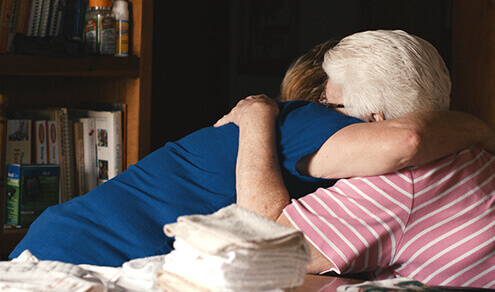

For most people, interpersonal relationships are essential to their self-care routine. However, some home-bound senior citizens are at risk of becoming isolated and lonely and some of our Home Helper’s clients were very depressed when their children hired us. While this can usually trigger mental health difficulties such as depression and anxiety, these negative effects can be combated when an individual is exposed to more socialization and contact with others. Whether you’re a caregiver or a senior yourself, you have in-home care options to help solve these mental health challenges. And at Home Helpers, we have some success stories of senior clients overcoming depression and isolation by being convinced to try some of the daycare socialization programs that we take many of our clients to.
Depression and Anxiety in Older Americans
Mental Health America estimates that two million people aged 65 and older are dealing with some form of depression. In many cases, it can be triggered or aggravated by chronic health conditions common among older individuals:
- cardiovascular disease
- cancer
- Alzheimer’s disease
- Parkinson’s disease
- arthritis
The Anxiety and Depression Association of America reveals that generalized anxiety disorder occurs frequently among seniors, particularly those who experience social isolation. Additionally, it can be prompted by specific events such as accidents or acute illnesses.
Social Isolation Is a Common Factor
It’s important to remember that there is a complex relationship between social isolation and both depression and anxiety. Those entering depressive or anxious states may withdraw from interpersonal interactions, and the lack of social contact may cause both conditions to worsen. In either case, reconnecting with people can serve as much-needed relief. While science is still trying to unravel the exact reasons why it’s theorized that the brain activity associated with socializing and the reinforcement of healthy behaviors directly counteract the havoc that depression and anxiety can wreak.
How In-Residence Senior Care Services Can Help
In-home services like the ones delivered by Home Helpers aren’t just limited to personal or respite care, or specialized options for loved ones with Alzheimer’s or dementia. Companion care allows you or your family member to stay socially engaged and active, and it’s a great method to counteract the risk of depression and anxiety resulting from excessive solitude and separation. A companion care professional can provide several simple yet helpful services:
- talking and listening
- playing games together
- accompaniment on appointments and errands
- assistance with reading
- navigating social media
Companion Care Contributes to Overall Health
The total wellness picture for you or your loved one isn’t limited to just physical or medical care. Because social isolation and loneliness can instigate or exacerbate depression and loneliness, a consistent schedule of social interaction is vital. That’s why Home Helpers includes companion care in its menu of services, so you can select it as part of a focused and customized care plan to meet your family’s needs.
Categories
Some seniors may think that not taking medicines on schedule is a minor thing, but it is not. Poor medication compliance is a serious and expensive problem. Not taking prescribed medications regularly is estimated by The Centers for Disease Control to kill 125,000 persons in the United States each year in the form of chronic disease treatment failures. In addition, an extra $300 billion is spent on hospitalizations, emergency room visits, and doctor’s appointments. One of the major tasks of senior care is making sure that loved ones are taking their medications correctly. At Home Helpers, we have recently seen the effects of medicine errors. A client with late-stage Alzheimer’s was given an increased dosage of anxiety and depression medicines by his psychiatrist. The client quickly deteriorated from a person who could walk and partake in many activities to someone almost comatose. Only after all medicines were stopped, he did begin to revert to his previous functioning levels.
Why do many elders not follow their doctors’ prescription instructions? The answers are many and complex. Forgetting to take medicines is a major problem for some elders, combined with the lack of understanding of the prescription’s purpose and importance. If an elder has unpleasant side effects when initially taking medicine, they may just quit taking it rather than consulting their doctor.
A caregiver may only be able to come over to the elder’s home on a periodic basis and does not know the extent of the non-compliance with medication. Having several prescriptions to keep track of makes the situation even more difficult. Here is an examination of some consequences of improper medication consumption.
Increased Disease Risk
Diseases can progress dramatically if medication is not taken correctly. If an elder does not take medication or does not take it as directed, they risk serious disease repercussions. Not taking blood pressure medicine daily at a set time can set the stage for an increased chance of stroke, kidney failure, and heart disease. Seniors taking statin-reducing medications can increase their risk of a heart attack by at least 25 percent if they quit the medications. Diseases can progress dramatically if medication is not taken correctly.
Hospitalization
Another consequence of improper medication compliance is emergency room visits and hospitalizations. This is because an elder has either stopped taking one or more medications, increasing the progression of a disease, or is taking them out of schedule, which can lead to dangerous medication interactions.
Tips for a Consistent Medication Schedule
An in-home care professional can help reinforce these tips to support a consistent medication schedule for an elder.
-
Follow medicine directions, ask for clarification if the directions are not clear
-
Use a pill container to help remember medicines, and refill it weekly on the same day
-
Use daily habits like tooth brushing or mealtime to reinforce medication schedules
-
Stick to your medication schedule each day
An in-home caregiver can be an alternative to a senior care facility and keeps your loved one at home while still keeping consistency with their medication schedule. Contact us today to learn how you can help your elder loved one remain safe but active, through in-home care.
Categories
At Home Helpers, we are frequently contacted by the children of our clients who have no clue about the information from a recent doctor’s visit.
If you or your loved one feels rushed during a doctor’s appointment, it may not be your imagination. With changes in Medicare and other insurance issues, physicians do not have as much time to spend with individual patients to ensure they understand medical conditions and treatment. Seniors who live independently or who have in-home care may be concerned that communication between patient and doctor is not clear enough to address health needs and questions. The answer to improving the doctor-patient relationship may be a combination of advocacy and organization.
Barriers to Communication
Effective interactions between elderly people and their physicians can be challenging for several reasons:
- Generational – Seniors grew up in a different time, when doctors were viewed as authorities who should not be questioned
- Sensory loss – With impaired vision or hearing, seniors may have difficulty understanding or following their doctor’s orders
- Cognitive limitations – Dementia, Alzheimer’s disease, and other cognitive decline may interfere with a senior’s ability to remember details or ask questions for clarification
Quality senior care may require assistance from a family member or a caregiver to provide information to help a doctor understand more about health status, issues, symptoms, and lifestyle in order to better treat an elderly person.
Overcoming the Obstacles
Family members, caregivers, and independent seniors can prepare for doctor’s appointments to make the most of the limited time available. The easiest way is by getting organized. Take the time to write out a thorough medical history, and be sure to include:
- Past health problems
- Treating physicians
- Current diagnoses
- Recent medical tests or surgeries
- A list of all medications and supplements, with frequency and dosage
- Any allergies
You should also write out a list of questions to discuss the doctor. Take along paper and pen to make notes in case you need more information. A caregiver or family member can be helpful at appointments to bring up any other concerns or to ask for clarification about any medical language, prescriptions, or other details. Try to stay focused; it’s easy to get off track when talking with a medical provider and forget one or several of the reasons for the visit. If you feel rushed, you can ask for another appointment for more time to ask questions.
Seniors, family members, and caregivers who provide in-home care can all take part in improving communication with doctors for improved relationships and better senior care. Home Helpers can also be part of the puzzle to assist you with medical appointments or any other needs for a better quality of life for you or your loved one and we are frequently asked by clients or their children who can’t be present for the appointment, to be with the doctor and client so they can report.
Categories
Managing diabetes properly is important in order to prevent serious consequences such as the loss of a limb, heart issues, kidney failure, or even death. The good news with most cases of diabetes is that it can be controlled with good eating habits. Whether you are a caregiver of someone with diabetes, or you have it yourself and want to manage your own diet, there are important things to consider when grocery shopping and meal planning.
Meal Planning
People who have diabetes are not able to process sugar properly because of insulin resistance. This means that one of the most important parts of diabetes management is to cut down on sugar intake, which can be challenging.
Whether you are receiving in-home care, are in an assisted living center, or you are living independently, planning your meals will not only help to keep your insulin in check, but it will also make mealtime easier. By planning ahead, you can be assured that you are making healthy choices both at the grocery store and while you are eating.
While you want to make smart food choices, you also need them to fit certain eating habits and specific schedules, or else it will be difficult to maintain. It may help to speak with a nutrition consultant who can guide and help you plan meals based on the glycemic index, the plate method, or watching your carbohydrate intake.
Healthy Choices
Controlling diabetes through diet will also benefit you in that it can reduce your risk for stroke and heart disease. Include a wide variety of food items to make sure you are getting all the essential nutrients and so you don’t get bored. Some good choices are:
- Chicken
- Lean meats
- Turkey
- Fish
- Vegetables
- Fruits
- Whole grains
- Low-fat dairy products
- Beans and legumes
The Plate Method
If eating healthy is a new concept for you, the plate method is a good guide. When you fill your plate, half of it should be filled with non-starchy vegetables, one quarter with protein, and the remaining quarter with starchy foods or grains. One serving of fruit and/or dairy can be added to round out the meal.
Eating this way will help you practice appropriate portion control and make sure you are ingesting high-quality food that is low in sugar. Share your new lifestyle goals with the people around you so that they can support you in your journey.
At Home Helpers, we offer an array of senior care, including diabetes assistance. We can help ensure that sugar levels are monitored and that good communication is maintained with the client and family members.
Categories

Deciding whether to place a family member in a nursing home is one of the most difficult and heart wrenching decisions that we face. It can seem like a no-win situation. On one hand, we can continue to try to act as caregivers to a loved one whose needs have grown beyond the limits of our schedules and abilities. On the other, we can try to convince them to leave their homes and move into assisted living facilities, an experience that is traumatic for everyone involved. They feel the anguish of being made to leave the home they love and relocate against their will, and we experience the helplessness associated with the inability to help them and the guilt of forcing them from a place of comfort that often holds a lifetime of joyful memories.
What many of us don’t know is that there is another choice. PACE – Programs of All-inclusive Care for the Elderly – can help provide the level of care our loved ones need while residing in their homes for as long as possible. Over 100 PACE programs in 32 states provide for home health and personal care, along with a host of other services, for seniors 55 and older who are certified to need nursing care but can safely live in their communities. The program is paid for by an annual fee that is typically covered by Medicare and Medicaid.
The National PACE Association says their model of care is “centered on the belief that it is better for the well-being of seniors with chronic care needs and their families to be served in the community whenever possible.” And research conducted on PACE programs over more than 30 years proves them right. Not only does in-home care through PACE prevent the stress of moving a senior family member into a nursing home, but it also results in better overall health and wellness. Studies have shown that those receiving care through PACE programs have fewer hospital admissions and shorter hospital stays than the average Medicare recipient and live longer than participants in Medicaid aged and disabled waiver programs.
Most importantly, participants in PACE programs are far more likely to describe themselves as happier, healthier, and feeling as though their health and personal needs are fully met. Both participants and caregivers give PACE high marks, with a near 100% satisfaction rate from seniors and their families. For those of us who are facing that incredibly difficult decision of whether to relocate our loved ones or care for them ourselves, PACE provides a better alternative for all of us.
Contact me if you would like more information.
